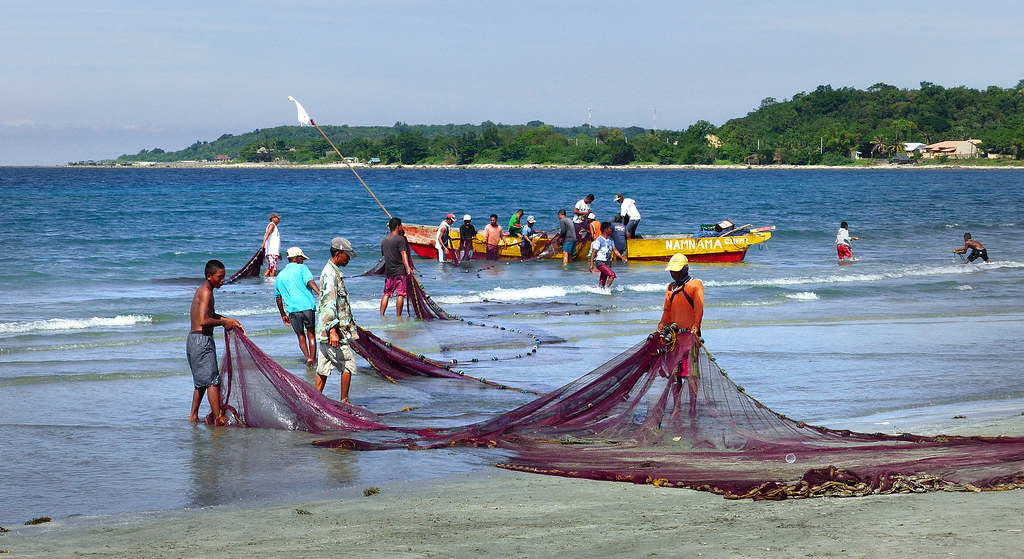Philippine bishops protest commercial fishing boats in waters reserved for small-scale fishermen
According to a 2024 Supreme Court ruling, the Mercidar Fishing Corporation company can now fish in waters in the 15-kilometre municipal fishing zone. “The integrity of Creation is threatened,” 48 bishops warn. For Caritas Vice Chairman Bishop Gerardo Alminaza, “the mandate of the Philippine Constitution” is “to protect the livelihoods of small-scale and artisanal fisherfolk.” Cebu fisherman laments: “They are slowly killing us.”
Manila (AsiaNews) – Philippine bishops have expressed concern about a Supreme Court ruling that removes preferential access for small-scale fishermen to municipal waters.
Bishop Gerardo Alminaza, representing the Diocese of San Carlos, said that the Court's decision, which upheld a decision by the Malabon Regional Court to allow commercial fishing in the municipal fishing zone within 15 kilometres, will have a significant impact on the livelihoods of the country's small-scale fishermen, leading to their definitive marginalisation, legitimising the monopoly and plundering by companies of traditional fishing areas.
Card Pablo Virgilio David, bishop of Kalookan and chairman of the Catholic Bishops' Conference of the Philippines, is among the 48 prelates who signed the Caritas Philippines statement.
“The integrity of creation is threatened, and our lives and survivals, particularly those of the artisanal and municipal fishermen, are challenged,” said Bishop Alminaza, who is also Caritas Philippines vice chairman.
With the Supreme Court's ruling in August 2024, previous provisions were nullified, allowing Mercidar Fishing Corporation, a private company, to fish in municipal waters.
The bishops have said that they will not stand idly by in the face of this threat. “We, as faithful stewards of God's gifts, are committed to advocating for the protection of our municipal waters and the rights of artisanal and municipal fishers,” the bishops said in a press release.
“It is our fervent hope that our policymakers act with the wisdom of our laws and the values of our faith – policies that uphold sustainability, empower local governance, and prioritize care for our common home – must not be sacrificed,” they added.
If the court's decision becomes final and executory, municipal fishermen, will no longer have preferential access to waters, and will thus face unfair competition.
The ruling’s far-reaching consequences for resource management, environmental protection, and the welfare of affected communities led the bishops to oppose it.
If the order is implemented, many parties will be adversely affected across the country, including towns with large constituents of fishers, who sought to intervene in the case, including the towns of Espinosa in Cebu and Del Carmen in Surigao del Norte.
The 15-kilometre fishing zone reserved for municipal fishers is around two million square km or 15 per cent of Philippine waters.
“It is the mandate of the Philippine Constitution and the government to protect the livelihoods of small-scale and artisanal fisherfolk, ensure food security, and preserve Philippine marine biodiversity,” the bishops’ statement reads.
The 1987 Constitution states that fishermen have "preferential use and access" to municipal waters. Many fishermen who agreed with the bishops are anxious.
“We cannot go to big lakes because we only use paddles and a pump boat for fishing,” said Noralan Pagal, a fisherfolk from San Remigio, Cebu. “The court and the government are torturing us with their ruling and stance on fishing. They are slowly killing us, as well as our families.”
Around 2.3 million people will be negatively impacted if the commercial interests take precedence. The most vulnerable people will face hunger and poverty.
The Supreme Court's decision is deeply troubling, because it goes against the nation's guiding principles.
The 1987 Constitution, the Local Government, the Republic Law 10654 (Fisheries Code 1998, as amended) and related national laws reaffirm the preferential rights of artisanal and small-scale fishers in municipal waters.
Martha Canda, leader and organiser in Northern Samar, talked about the hardships fishermen and their families already face.
For her, “When we allow the powerful to encroach upon the rightful inheritance of the poor, we fail our fisherfolk, greater society, and our duty to God and His Creation. It would be cruel to add even more to our fishermen's burden.”
23/11/2020 13:34
30/12/2017 12:32







.png)










